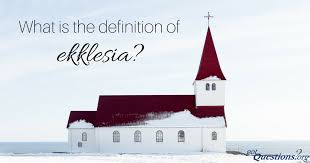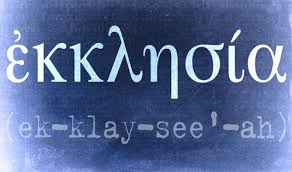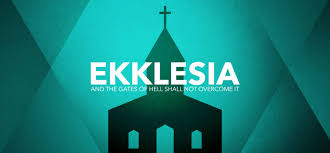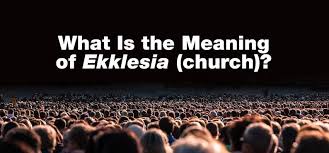What Does “Ekklesia” Mean?
The New Testament is a collection of writings which make use of, not just one, but somewhere around twenty words to communicate to its readers the nature of a community of Christians (disciples, Christians, the body of Christ, brothers, holy ones, God’s people, etc.). Out of these twenty words, today’s religious people have chosen for almost exclusive use the one word, ekklesia.
In the first century, the word ekklesia was a Greek common noun, never capitalized, used in the ordinary everyday street language of the people. Also, the word ekklesia was a “compound noun.” The English language has many compound nouns (baseball, household, gingerbread). The word ekklesia was a Greek compound noun made by combining the words ek (out of) and kaleo (I call). But a very important fact needs to be observed. Not all compound nouns are defined by the two words that comprise them. The word “household” is composed of “house” and “hold,” but it does not mean “to hold a house.” “Gingerbread” is bread that contains ginger, but it also contains other ingredients, so that its two words do not adequately define it. The two words which comprise a compound noun may not define it at all (household) or they may not completely define it (gingerbread). In the same way, “called out” is not the complete meaning of ekklesia; the two words from which ekklesia is derived do not adequately constitute its definition. This can be seen when one realizes that ekklesia expressed a collective idea and people can be “called out” without being “called together.”
It is often said that Colossians 1:13 teaches that ekklesia means “called out.” Colossians 1:13, however, does not use the verb “called out” at all! Paul wrote: “He has rescued us [rhuomai—rescue, save, deliver] from the power of darkness and transferred us [methistemi—remove from one place to another] into the rule of the Son of His love.” “Called out” was never expressed in the New Testament by one verb; that idea always took two words, as in 1 Peter 2:9: “So that you may proclaim the glories of the One who called [kaleo] you out of [ek] darkness into His wonderful light.”
The first-century definition of ekklesia was stated in the New Testament itself very soon in the story of the spread of Christianity. In Acts 19, Paul came to Ephesus to teach people about Christ. Those who opposed that activity brought to the Ephesian amphitheater what is called in verse 32 and verse 40 an ekklesia. This word is translated by both the King James Version and the American Standard Version as “assembly”! The town clerk of Ephesus, in attempting to calm this situation, told this “assembly” of people in verse 39 that if they had any grievances, they should take these to the ekklesia, which word the King James Version and the American Standard Version again translated “assembly,” and by which word the town clerk was referring to the group of leading citizens in Ephesus who held regular meetings for the purpose of conducting city business and deciding city affairs.
This citation from God’s Word . . . should be, to all Scripture-loyal people, sufficient by itself to establish the word’s first-century meaning, but extra-New Testament literature furnishes additional support. In Himerius (4th century AD), Orations 39,5, the word ekklesia was used to refer to a group or gathering of animals in the Thracian mountains. In Diogenes Laertius (3rd century AD), 8,41, Hermippus used the word to refer to the community of Pythagoras. Josephus (1st century) Antiquities, 12,164; 19,332 uses the word, as Acts 19:39 does, to refer to a regularly summoned political body. I Maccabees (1st century BC) 3:13 uses the word as “gathering” or “meeting.” These writings are by no means presented here as divinely inspired, but they perform for us the very important service of showing us the meaning of words in first-century minds. They, as well as Acts 19, support the fact that first-century people were in the habit of using the word ekklesia to mean “assembly, group, gathering.”
When God’s New Testament writers started writing their gospels and letters, a significant thing happened. These inspired men took this common noun ekklesia, an ordinary conversation-word of first-century people, and adapted it to their purposes, altering its definition, by one very ingenious technique. They added to it the phrases tou Christou or tou theou, thus making it “assembly of Christ” or “assembly of God,” thereby making the word ekklesia a term for Christians, communicating to first-century people a divine concept by employing a word from their common usage. Jesus himself was the first to do this with ekklesia in Matthew 16:18, calling it “My ekklesia.”
Thus, the first-century meaning of the word ekklesia (as shown by God’s words in Acts 19 as well as extra-New Testament usage) was “assembly, group, gathering,” and in the minds of New Testament writers, “assembly of Christ” or “assembly of God.” Thus the New Testament speaks:
- “Upon this bedrock I will build up my assembly” (Matthew 16:18).
- ” Now on that day a severe persecution started against the assembly in Jerusalem” (Acts 8:1).
- ” Saul was trying to destroy the assembly, entering into the houses” (Acts 8:3).
- ” The assembly in the whole of Judea and Galilee and Samaria had peace, being built up” (Acts 9:31).
- ” Now it happened that even for a whole year they came together with the assembly and taught a considerable throng” (Acts 11:26).
- ” Shepherd the assembly of the Lord which He acquired for Himself through His own blood” (Acts 20:28).
- ” Greet Prisca and Aquilla . . . and the group that is in their house” (Romans 16:3,5).
- ” All the assemblies of Christ greet you” (Romans 16:16).
- ” As in all the assemblies of the holy ones, let the women be silent in the assemblies” (1 Corinthians 14:33,34).
- ” He is the head of the body, the assembly” (Colossians 1:18).
The English language was first spoken on this planet as a Germanic dialect, known as Old English or Anglo-Saxon, which began to be spoken in northern England some years after the Anglo-Saxon conquest of that island starting in 449 AD. The earliest written Old English, however, did not appear until approximately 800 AD. If we allow 50 years for the conquest to have its effect on England’s native dwellers, that means sometime around 500 AD, the people in northern England started referring to a building erected for worship as a cirice, later, chirche, and finally, a church. It is extremely difficult to understand how this word which was not spoken anywhere on earth until 400 years after the New Testament was written and cannot be shown by a single citation to have been a word known to first-century people—how this word could be the definition of a first-century word, yet, that is what thousands of people today believe and teach! Asserting that “church” is not a building, we have teachers who continue to use the word “church,” which designated the buildings of the people of northern England!
Premise 1: Most of us teach “we speak where the Scripture speaks and we are silent where the Scripture is silent.”
Premise 2: The Scripture speaks the word “assembly, group, gathering.” It is silent regarding the word “church.”
Conclusion: Those who teach the word “assembly, group, gathering” are honoring the Scripture’s voice and silence; those who teach the word “church” are rejecting the Scripture’s voice and silence and honoring in its place the voice of the 6th century people of northern England!
Three facts need to be realized:
(1) While the King James Version makes useof the word “church,” the New Testament as written in the first century, uses that word nowhere at all on any one of its pages!
(2) Anyone who consults an English dictionary will see that the word “church” has several definitions, all of them different. That means the word is totally inadequate for expressing the nature or essence of a group of Christians who are functioning according to the first-century-pattern of teaching and worship.
(3) Since there are somewhere around twenty words used by Scripture, God must have thereby intended to emphasize the many-faceted nature of a community of Christians instead of restricting that nature by the use of one word; and wouldn’t it be logical to expect that those who are concerned about God’s way of doing things would adopt the same usage?
(This article by Don Reb first appeared in Firm Foundation, June 3, 1980).
Comments
We believe that the foregoing article has an important message that should be thoughtfully considered by those who wish to develop proper Scriptural concepts. One questionable part of the article, however, is its failure to recognize that many Bible students hold that the word ekklesia is not to be interpreted primarily in terms of its secular and political use by the Greeks. Rather, it is to be seen in light of the LXX or Septuagint (the Greek translation of the OT which was widely used by Jews in the Greco-Roman world), where it referred to Israel, the people of God. Just as the people of God in OT times were called the ekklesia, so the people of God in the first-century (the Christians) were called the ekklesia, or the community, of God.
We agree that since “church” has an ecclesiastical connotation today and fails to precisely reflect the meaning of ekklesia (thereby encouraging questionable concepts of the body of Christ), we might better translate the Greek term with such words as the following: assembly, congregation, company, gathering, group, or community. Notice the following expressions referring to God’s people, all of which use ekklesia in the original:
- ” My community” (Matt. 16:18).
- ” The assembly of God” (1 Cor. 1:2).
- ” The company of the living God” (1 Tim. 3:15).
- ” The congregations of Christ” (Rom. 16:16).
- ” The assemblies of the saints” (1 Cor. 14:33).
- ” The community of the first-born” (Heb. 12:23).
When we use these synonyms in place of “church” we can capture something of the meaning that the New Testament writers were trying to convey. There was nothing of sectarianism or denominationalism here. Other references to the body of Christ show that the New Testament writers freely used expressions that were not sectarian. Notice some of these:
- “the household of the faith” (Gal. 6:10).
- ” the household of God” (1 Tim. 3:15; Eph. 2:19).
- ” Christ’s body” (1 Cor. 12:27).
- ” the body of Christ” (Eph. 4:12).
- ” a temple of God” (1 Cor. 3:16).
- ” the temple of the living God” (2 Cor. 6:16).
- ” a holy temple in the Lord” (Eph. 2:21).
- ” a spiritual house” (1 Pet. 2:5).
- ” the people of God” (Heb. 4:9; 1 Pet. 2:10). ” the brotherhood” (1 Pet. 2:17).
In each case, the term was not mean to be exclusive or sectarian, but simply descriptive of a relationship or position that believers enjoy. Nor were the terms given to officially denominate (give a proper name to) the people of God. The Lord’s body has no exclusive title as religious organizations do. Our Lord’s community is not “denominational” in nature!
Let others use “church” or any other term they wish. Let the “Lutheran Church,” the “Catholic Church,” the “Methodist Church,” the “Presbyterian Church,” and the “Pentecostal Church” use the term. Let the “Baptist Churches” and others employ it. But let us seek to be as Scriptural as possible and convey truth even in what we call ourselves!
Richard Hollerman
Notice also the article, “Christians Only,” on this Website!






 You can reach us via e-mail
at the following address:
You can reach us via e-mail
at the following address: